Keresés: %s
Keresés: %s
General Affairs Council, 11 May 2021.
At the General Affairs Council meeting on 11 May 2021, Hungary was represented by Minister Judit Varga and Secretary of State Oszkár Ökrös. The Council was chaired by Ana Paula Zacarias, Portuguese Secretary of State for EU Affairs, and the Commission was represented by Vice-Presidents Maroš Šefčovič.
COVID-19 EU coordination
The General Affairs Council took stock of the actual situation regarding the Covid-19 epidemic, followed by an exchange of views on the most pressing issues concerning the epidemic, such as the current situation on vaccines, the ongoing work on digital green certificates, the overall epidemiological situation and travel restrictions.
Special European Council meeting on 24-25 May 2021
The General Affairs Council held an exchange of views about the preparation of the upcoming special European Council meeting on 24 and 25 May based on the annotated draft agenda and the draft guidelines. The Ministers focused on climate change, Russia and the implementation of the Trade and Cooperation Agreement (TCA) with regard to the United Kingdom.
Conference on the Future of Europe
Ministers for European Affairs were informed by the Presidency about the state of play regarding the Conference on the Future of Europe, following the meeting of the Conference’s Executive Board and the formal inaugural event (https://www.europarl.europa.eu/resources/library/media/20210507RES03761/20210507RES03761.pdf) on 9 May in Strasbourg.
At its meeting on 9 May, the Executive Board of the Conference approved the Rules of Procedure regarding the composition and working methods of the Plenary of the Conference, which supplement the previously adopted Rules of Procedure for Citizens' Participation and the Working Method of the Executive Board. With this, the Rules of Procedure of the Conference have been completely finalised.
The Conference on the Future of Europe is aimed at involving citizens in a wide-ranging debate on Europe’s future. The Presidency reiterated that the Executive Board of the Conference launched the multilingual digital platform for the Conference on 19 April 2021, inviting all EU citizens to contribute to shaping their own future and that of Europe as a whole. (https://futureu.europa.eu/?locale=en)
By spring 2022, the Conference is expected to reach conclusions and provide guidance on the future of Europe.
Enlargement and Stabilisation and Association Process
Ministers took stock of the Enlargement and Stabilisation and Association Process. The Presidency reiterated its priorities for the coming months, namely to finalise the negotiations on the IPA III (Instrument for Pre-accession Assistance) Regulation, to organize Intergovernmental conferences with Montenegro and Serbia under the revised enlargement methodology, and to organise the first Intergovernmental conferences with North-Macedonia and Albania.
EU-Switzerland relations
The Commission provided an assessment of the EU-Switzerland relations and briefed ministers on the state of play of the negotiation of the EU-Switzerland Institutional Framework Agreement, ministers then took stock of the EU-Switzerland relations.
Fairer, more equitable opportunities and innovation have been the subject of discussion in the Education, Youth, Culture and Sport Council 17-18 May 2021, Brussels
The Council adopted conclusions on equity, inclusion and success in education and training for all and on the European Universities initiative. The European Universities initiative is one of the most important and most innovative European initiatives in the field of higher education; it is a fundamental pillar of the European Education Area to be built by 2025. It is a success that Hungarian higher education institutions participate in 11 European University alliances out of the 41 European alliances. Following up on the Council conclusions on the European Universities initiative, ministers held a policy debate on the future of European higher education and, in particular, on the role of higher education institutions, as drivers of change towards the digital and green transitions.
In the youth field, the Council adopted conclusions on strengthening multi-level governance when promoting the participation of young people in decision-making processes, to ensure that all young people have equal opportunities for participation, involvement and empowerment in relevant decision-making processes. Young people are among those who have been hardest hit by COVID-19 pandemic. The ministers during their public debate discussed the need to introduce evidence-based, cross-sectoral policies, involving young people, while taking into account their rights, the trends and challenges that affects them, and ensure fair and equal opportunities in all areas of their life.
Cultural and creative sectors are among the hardest hit by the COVID-19 pandemic. The conclusions on the recovery, resilience and sustainability of the cultural and creative sectors adopted by the Council responds to that, while also applying a more ambitious and far-sighted approach, concerning some structural challenges in the sector brought into the forefront by the crises. Cultural ministers also discussed about the diversification of funding sources and mechanisms for the safeguarding and protection of European cultural heritage.
The Council adopted conclusions to support the recovery of the news media and audiovisual sectors after the COVID-19 pandemic and their digital and green transformation, also providing guidelines to the Commission for the implementation of the initiatives foreseen in the Media and Audiovisual Action Plan published in December 2020.
In the field of sport, the Council has approved conclusions on sport innovation and discussed about the potential of sport diplomacy and whether an EU sport diplomacy strategy is needed.
Competitiveness Council, 27-28 May 2021, Brussels
The first day’s agenda of the Competitiveness Council meeting of 27 May 2021 was dominated by two main topics, namely the Digital Services Package and the updated European industrial strategy. First, ministers took stock of the ongoing negotiations on the elements of the Digital Services Package. Hungary agreed that it was timely to introduce new rules to combat illegal content with uniform rules at EU level, while respecting fundamental rights, in particular the freedom of expression and privacy of European citizens. Furthermore, in order to create and maintain a fair digital market competition, which is open for all enterprises, Hungary supports the development a set of obligations aimed at undertakings with significant market power (the so-called gatekeepers), thereby creating legal certainty for all stakeholders. At the same time, Hungary called for putting in place the right enforcement structures, with the greater involvement of Member States’ authorities.
During the debate on the updated European industrial strategy, the Member States agreed on the need to restore the functioning of the internal market and to ensure the free movement of goods, persons and services. In addition, all Member States supported the Commission's objective of reducing strategic dependencies, in particular as regards access to critical raw materials. As for Hungary, it was also mentioned that an incentive system should be developed in order to speed up the process of repatriating key activities.
The next day, at the Research Section of the Competitiveness Council, Ministers endorsed the general approach of the European High Performance Computing Regulation and the Council conclusions on research careers. It was followed by a policy debate on the renewal of the European Research Area (ERA). During the debate Ministers agreed that research and innovation is essential for the Future of Europe and they emphasized the need for a common political agenda for social purposes. They agreed to invest 3% of the GDP in research and innovation and that the new design of the ERA should be implemented in an inclusive manner, respecting specificities of Members States. Furthermore, Ministers emphasized that Research infrastructure, supporting researchers' careers, and institutional capacities and incentives play an important role in renewing the ERA. Hungary underlined that it was inevitable, that the ERA relies on cooperation with the Commission, Member States and R&I stakeholders. The Horizon Europe program should play a key role in translating the vision of the ERA into the programming process.
At last, in the Space Policy formation delegations agreed that a European approach has to be developed regarding Space Traffic Management, in order to have the ability to preserve our space infrastructure and our strategic autonomy. Besides, this European approach is expected to support new entrepreneurial interests in the field and contribute to a leading role at international fora. The roadmap to this common approach, presented by the Presidency, was welcomed by the Member States as well. Hungary underlined the importance of a close cooperation the European Space Agency in this area.
Hungary is willing and capable to strengthen the European defence capabilities
On 2 June, 2021 Gergely Németh, Defence Policy Director and Deputy State Secretary for Defence Policy of the Ministry of Defence of Hungary and Bálint Ódor, Hungarian PSC Ambassador had a series of discussion about current affairs of the Common Security and Defence Policy (CSDP).
Discussions were held at the European External Action Service with Deputy Secretary General Charles Fries and Managing Director Paweł Herczynski along with the directors responsible for security and defence policy (Joanneke Balfoort) and integrated approach (Stefano Tomat). During the consultations, Deputy State Secretary Gergely Németh highlighted that the security of Europe and its citizens is a key priority for Hungary, thus the strengthening of CSDP and Hungary’s active contribution therein is an important objective. He further emphasised, that as a result of the National Defence and Armed Forces Development Program not only Hungary’s own military capabilities have been developed, but our capacity for strategic cooperation also increased. We want to strengthen this cooperation in both the frameworks of NATO and the European Defence Policy. Therefore, we are both willing and capable to effectively cooperate.
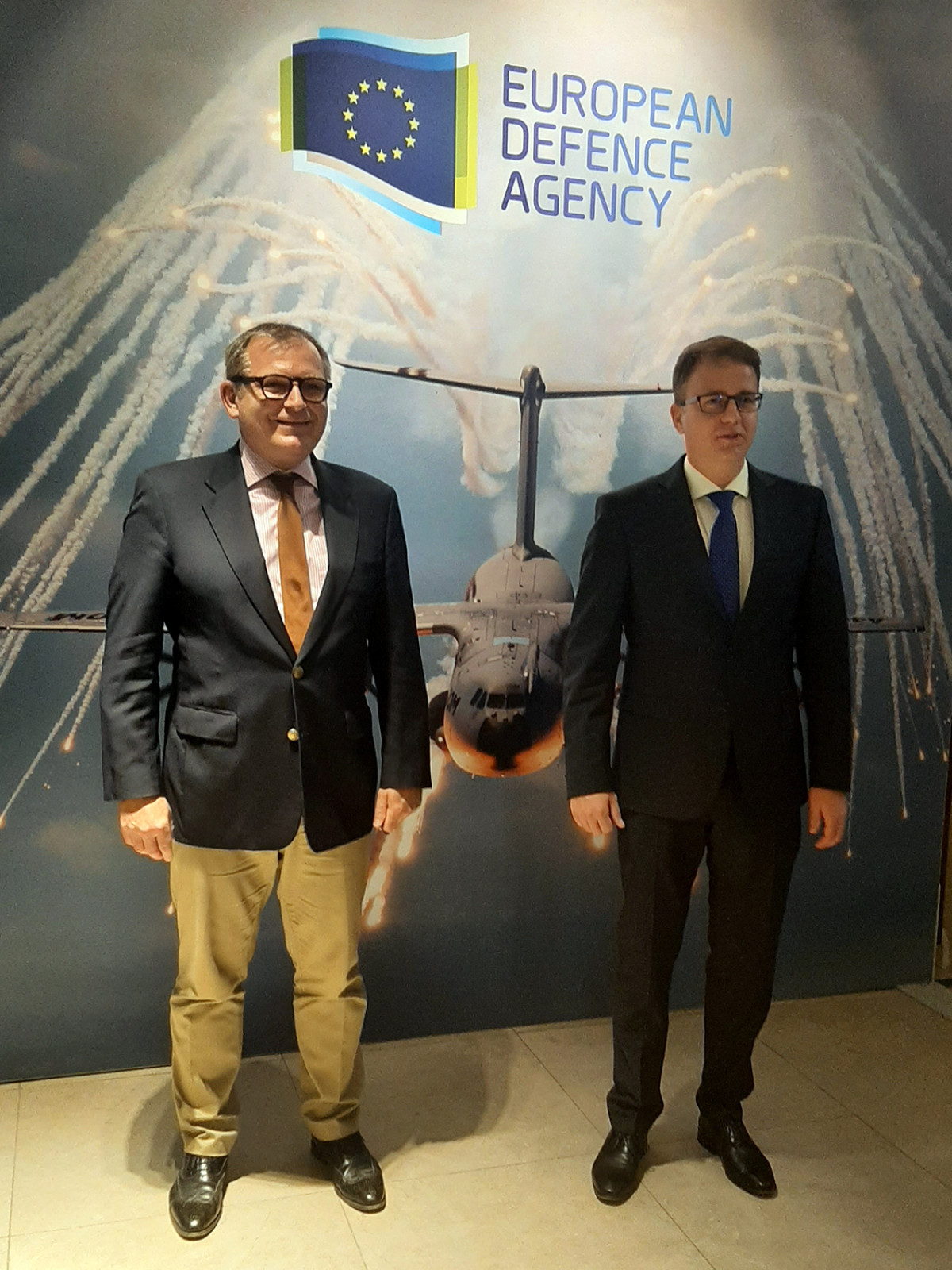
The discussions touched upon the significant challenges that European security faces: notably with regards to the Western-Balkans; the opportunities that the European toolbox can provide to stabilise the crisis situations in the African continent; the strengthening of EU-NATO cooperation; and the defence policy elements of the upcoming Hungarian V4 presidency.
Deputy State Secretary Németh has touched upon several issues with Jiří Šedvy, Chief Executive of the European Defence Agency (EDA), such as the Agency’s special role in CSDP, the importance of the defence initiatives and the collaborative opportunities of multinational capability development. The parties agreed to step up cooperation and to maintain regular dialogue.
The current status and the opportunities of the European defence industry were discussed with Timo Pesonen, Director-General of the Commission’s DG DEFIS. Deputy State Secretary Németh underlined the need to strengthen the European Defence Technological and Industrial Base. Hungary aims at integrating the Hungarian defence industrial stakeholders – notably the small and medium sized enterprises – into the European “defence-ecosystem”. Therefore, Deputy State Secretary Németh expressed Hungary’s willingness to deepen cooperation in this regard.
source: honvedelem.hu
Ministers discussed the use of EU’s digital certificate - Health EPSCO Council
The EPSCO Council of health ministers took place on 15 June 2021 in Luxembourg. On behalf of Hungary, Prof. Dr. Ildikó Horváth Minister of State of Health attended the meeting. The main agenda item was related to the Covid-19 situation; the ministers discussed the use of the European digital covid certificates and the possibility of recognizing certificates issued in third countries. Ildikó Horváth highlighted that Hungary had achieved a high level of vaccination very early and therefore we were able to ease non-pharmaceutical interventions largely.
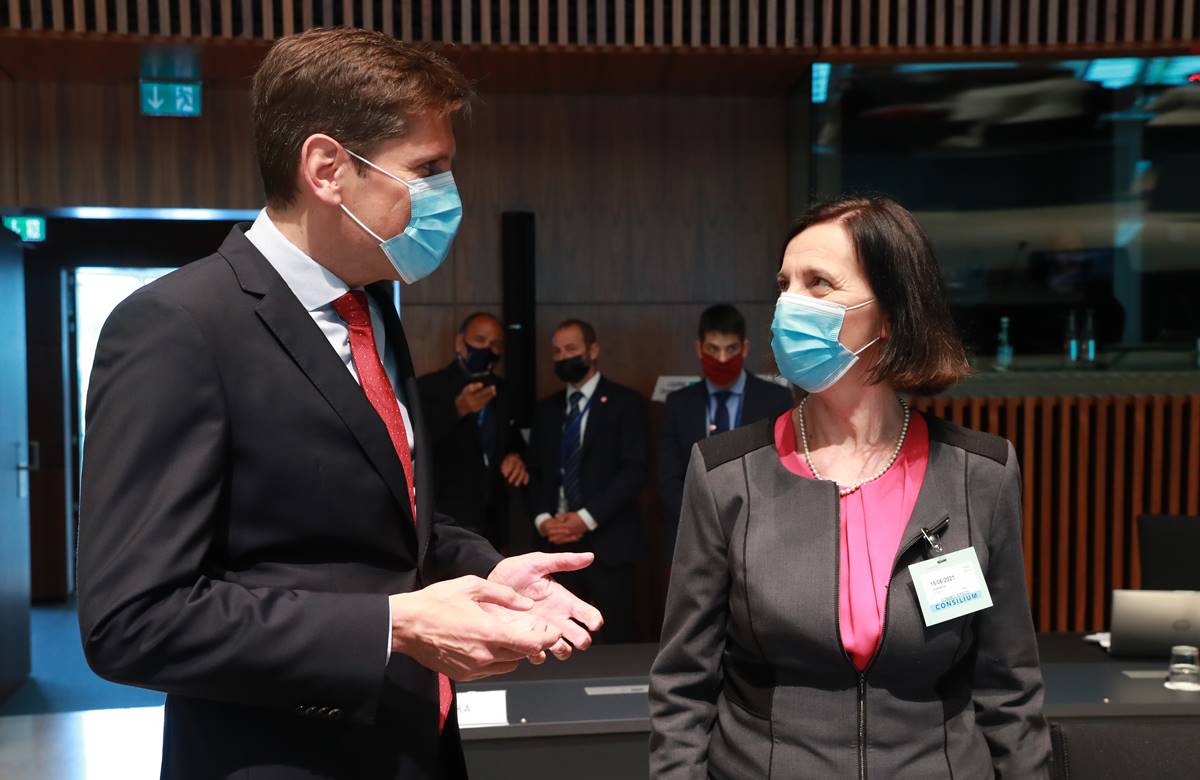
source: consilium.europa.eu
Following the first couple of weeks after lifting the restrictions, our experiences show that the decline of the epidemic remained unchanged. This is a clear evidence for the incomparable benefit of vaccination and more precisely the efficiency of all the vaccines applied in the Hungarian portfolio. Ildikó Horváth informed her colleagues that the Hungarian immunity certificate plays a key role in supporting active a participation in community life. In order to facilitate the recognition of the certificates in third countries, the Hungarian Government has signed a number of bilateral agreements and supports the promotion of interoperability at global level.
The Council has reached a general approach on the draft regulation on the strengthened mandate of the European Medicines Agency, so the negotiations with the co-legislators can start soon. The new regulation will provide a better coordination to secure safe supply of medicines and medical devices during next emergencies. The two remaining parts of the European Health Union package, namely the draft regulations on the ECDC and cross border health threat have also a good chance for a successful conclusion during the Slovenian Presidency, according the progress report adopted by the Council.
The ministers adopted Council Conclusion on the availability, access and affordability of pharmaceuticals and medical devices. The document strikes balance between the need of supporting innovation and ensuring affordable prices of health technologies for the benefit of the patients as well as of the healthcare systems.
The social and employment ministers meeting within the EPSCO Council on 14 June 2021
Since the outbreak of the COVID-19 pandemic, social and employment ministers had their first physical meeting within the EPSCO Council on 14 June 2021 and they discussed several issues. They held three policy debates (on minimum wages, the follow-up of the Porto Social Summit and collective bargaining) and adopted a recommendation as well as three sets of conclusions.
The ministers adopted a Council Recommendation establishing a European Child Guarantee. The aim of this recommendation is to prevent and combat social exclusion of children, by guaranteeing access to a set of services, such as to high quality early childhood education and care, education and school‑based activities, at least one healthy meal each school day and healthcare. Hungary welcomed the Recommendation as combating child poverty and supporting families are key priorities of the Government. We have already taken several measures implementing this Recommendation, e.g. the children’s attendance in kindergarten is compulsory from the age of three; free meal is available both on school days and holidays which almost 600,000 children benefit in.
This March the European Commission published a new long-term strategy on the rights of persons with disabilities and the Council has approved conclusions in order to endorse the strategy. Hungary supported the adoption of these conclusions that accelerate the implementation of the UN Convention on the Rights of Persons with Disabilities. In 2007, Hungary was one of the first to sign the Convention and ratified both the Convention and its Optional Protocol. Since then, we have taken wide-range of measures to support the education, training, employment, as well as independent living of people with disabilities and we have also been working to improve accessibility. The Hungarian Government has a special focus on employment and as a result, the employment rate of persons with disabilities has increased significantly: 10 years ago, it was only 18%, while in 2020 it reached 44%.
The Council adopted conclusions on telework, calling on Member States to consider establishing national action plans or strategies addressing the opportunities and risks related to telework in its different dimensions. In the document the Council also called on the Commission to promote further research on telework.
The ministers held a constructive political debate on the Commission’s proposal for a directive on adequate minimal wages in the European Union, where the majority of the Member States called for cautious rules that protect – apart from the workers right for decent wages - the autonomy of the social partners and the competence of the Member States. Regarding the social partners , the ministers expresses the same views during the political debate about the new challenges for social dialogue and collective bargaining.
Environment ministers endorsed the Council position on the new EU strategy on adaptation to climate change and discussed the new EU action plan on zero pollution
During the Environment Council held on the 10th of June, ministers approved the Council conclusions on the new EU strategy on adaptation to climate change. Majority of the ministers highlighted that the aspects of adaptation to negative impacts of climate change should be reflected in different Union-level policies, in order to strengthen the resilience of the EU’s economy and society. The Presidency informed the ministers on the progress with regard to the discussion of the legislation on batteries.
Ministers exchanged views for the first time on the Commission’s new EU action plan on zero pollution. The document sets out a vision by 2050 for zero-pollution in the air, water and soil in the EU, in order to create a toxic-free environment. The comprehensive Action Plan outlines key 2030 targets for various types of pollution and defines a number of actions and flagship initiatives to achieve the zero pollution ambition, including several ongoing and planned legislative proposals.
Energy ministers adopted the Council’s position on the future of the EU energy infrastructure and discussed the role of the EU’s hydrogen and renovation wave strategy on the road to climate neutrality
At the Energy Council on 11 June, ministers adopted the Council position on the regulation on trans-European energy infrastructure. Hungary supported the Presidency's compromise proposal, which reflects climate policy goals but also provides intermediate steps through the transformation of the existing natural gas network, which, for several Member States is a key for a cost-effective energy transition. On the road to climate neutrality, natural gas not only has a key role to play as a transitional energy source, but is also essential in scaling up the hydrogen economy. Existing natural gas infrastructure provides the most optimal and cost-effective solution for understanding the specifics of hydrogen transportation and storage.
While exchanging views on the EU hydrogen strategy, Secretary of State Attila Steiner informed the participants about the adoption of the Hungarian hydrogen strategy. He emphasized the need to create an incentive framework in the new regulatory framework, together with targeted funding mechanisms.
Ministers adopted council conclusions on a renovation wave. Renovation of buildings will not only improve the living conditions of consumers and reduce their energy bills, but will also contribute to economic growth, emissions-reduction and job creation.
Telecom Council on 4 June, 2021
Telecoms ministers exchanged their views on the Digital Compass at the Telecommunications Council on 4 June. The Digital Compass is an EU strategic document setting out the Union's digital objectives for 2030, which aims to enhance digital skills, build secure infrastructures, digitally transform companies and digitalize public services. Member States support the ambitious goals of the strategy, highlighting the role of multi-country projects and Digital European Innovation Hubs. Emphasis would be put on further developing digital skills, especially by supporting SMEs, and several Member States' representatives emphasized the need for building European capacities. The adoption of the Lisbon Declaration on digital rights has been considered a positive development.
The ministers also took note of the progress reports on the draft Data Governance Act and the proposal on the Directive on measures to ensure a high level of cyber security across the Union.
The Portuguese Presidency provided information on the state of play of the negotiations on the draft Regulation on privacy and electronic communications. Interinstitutional negotiations with the European Parliament began after 4 years of negotiations within the Council. The Presidency also briefed on the legislative process on the revision of the roaming regulation, and the European Commission presented the world's first draft regulation on artificial intelligence.
General Affairs Council, 22 June 2021, Luxembourg
At the General Affairs Council meeting on the 22nd of June 2021, Hungary was represented by Minister Judit Varga and Minister Péter Szijjártó. The Council was chaired by Ana Paula Zacarias, Portuguese Secretary of State for EU Affairs, and the Commission was represented by Vice-Presidents Maroš Šefčovič and Dubravka Šuica, Věra Jourová and Commissioner Olivér Várhelyi.
Enlargement and Stabilisation and Association Process
During the General Affairs Council on the 22nd of June 2021 the Ministers for European Affairs had an exchange of views on all files related to the Enlargement and Stabilisation and Association process. The Presidency provided information on progress achieved during the semester, namely the recent political agreement with the European Parliament on the Instrument for Pre-accession Assistance (IPA III) and the agreement by the Council on the application of the revised enlargement methodology to the accession negotiations with Serbia and Montenegro, that paved the way for the holding of the first "political" Intergovernmental Conference with the two candidate countries. Ministers also discussed the accession negotiations with North Macedonia and Albania. The Intergovernmental Conference with Montenegro and Serbia took place in the margins of the Council meeting.
European Council meeting on 24-25 June 2021
The General Affairs Council held an exchange of views about the preparation of the upcoming European Council meeting on the 24th and 25th of June based on the draft conclusions. The Ministers focused the discussion on Covid-19 pandemic, economic recovery, migration, Turkey, Libya, Russia, Belarus, Sahel and Ethiopia.
Conference on the Future of Europe
During the General Affairs Council on the 22nd of June 2021 the Ministers for European Affairs were informed by the Presidency about the state of play regarding the Conference on the Future of Europe. The formal inaugural event was held on the 9th of May in Strasbourg.
The “Lisbon European Citizens” event was organised on the 17th of June in Portugal. On the 19th of June, the inaugural Plenary meeting of the Conference on the Future of Europe was held in Strasbourg. The Conference on the Future of Europe is aimed at involving citizens in a wide-ranging debate on Europe’s future.
The Presidency reiterated that the Executive Board of the Conference launched the multilingual digital platform for the Conference on the 19th of April 2021, inviting all EU citizens to contribute to shaping their own future and that of Europe as a whole. (https://futureu.europa.eu/?locale=en) By spring 2022, the Conference is expected to reach conclusions and provide guidance on the future of Europe.
Rule of law in Poland
The Council held a hearing on the rule of law in Poland (Article 7 (1) TEU procedure), conducted pursuant to the standard rules approved by the Council in 2019.
Values of the Union in Hungary
The Council held a hearing on the rule of law in Hungary (Article 7 (1) TEU procedure), conducted pursuant to the standard rules approved by the Council in 2019.
EU-Switzerland relations
The Council was briefed by the Commission on EU-Switzerland relations, in particular on the termination of negotiations on the Institutional Framework Agreement, the Ministers then took stock of the EU-Switzerland relations.
Strategic autonomy
The Ministers held a brief exchange of views on possible directions for achieving strategic autonomy. The Commission will provide a detailed assessment of open strategic autonomy in its Annual Strategic Forecast Report in autumn 2021.
European Union Strategy for the Danube Region (EUSDR)
In the framework of the General Affairs Council, European Affairs Ministers commemorated the 10th anniversary of the adoption of the European Union Strategy for the Danube Region (EUSDR).
Member States supported the provisional political agreement on the CAP reform
Agricultural Ministers confirmed the provisional agreement on the reform of the Common Agricultural Policy during the Agriculture and Fisheries Council meeting in Luxembourg held between 28-29 June.
During the incoming Slovenian Presidency the provisional deal will be translated into the legal texts. Later on the three legislative proposals of the CAP reform package will be formally adopted by the Council and the European Parliament.
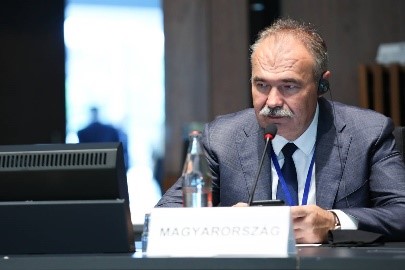
Member States have to submit their CAP Strategic Plans to the European Commission until the 31st of December 2021.
The new CAP legislation will enter into force by the 1st of January 2023.
During the two day meeting Ministers discussed different topics, as the situation of agricultural markets, the special protection goal for honey bees and antimicrobial resistance among others.
Press statement by Prime Minister Viktor Orbán as Hungary takes over the Presidency of the Visegrád Four - 30 June 2021, Katowice
Allow me to welcome you all,
Dear Mateusz,
Dear Colleagues,
I congratulate Poland on its performance over the past year. The Polish presidency was hit by the most difficult year in recent decades, but it has managed to keep cooperation between our four countries operating, and not one of the four has been left to face its difficulties alone. We have worked together to bring home our citizens who were stranded abroad, to coordinate the distribution of supplies, to send doctors to one another when needed, and to provide vaccine assistance. Once again, Dear Mateusz, Honourable Prime Minister, congratulations to Poland!
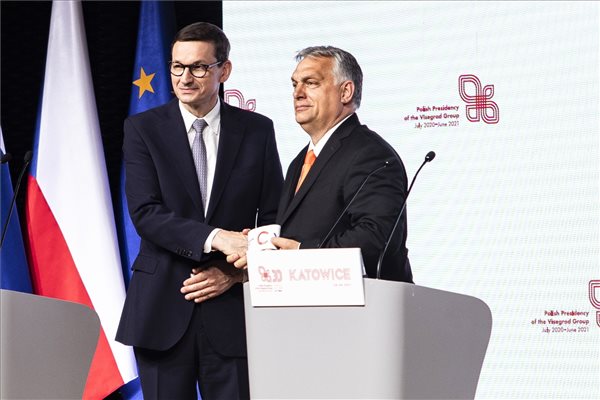 Fotó:MTI
Fotó:MTI
The Hungarian presidency is aware of the fact that the strength of any team is only as good as the quality of its players, and that the manager has nothing to add to this, but can only do some organisational work. Our presidency is also aware of the fact that the world has changed after the pandemic, and that the status quo in world politics and the world economy has been redrawn. I would like to draw your attention to the fact that never before in economic history has the volume of trade between China and the USA been greater than the volume of trade between the EU and the USA. Nor has there ever been a time when the EU–China trade volume was greater than the EU–US trade volume. In the meantime the world’s largest free trade area has been created in Asia. In the meantime Brexit has become reality; this gives me – us, the organisers of our work in the coming year – a special task, because we do not want to lose Britain. The V4 considers it important to continue working with Britain after Brexit. Britain is a defining player in the security architecture of Central Europe, so we now need to build a good relationship with it as a non-EU state. And the world has also changed because of important things which have happened in the V4. If we look at the four countries as one entity, we are the seventeenth largest economy in the world – which would put us in the G20. We are growing at twice the rate of the European Union, and the public debt of our four countries is only 4 per cent of the public debt of the European Union as a whole. And, if you look at them as one entity, these four countries have a larger working population than any country in the European Union except Germany; so we have countries that are extremely industrious, ambitious and keen to work.
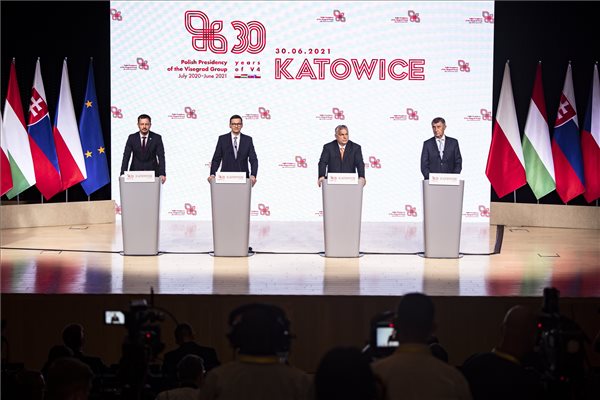 Fotó:MTI
Fotó:MTI
In the coming year the Hungarian presidency will work to ensure that in this altered situation we V4 countries are among those which win from global economic change. We have therefore identified three main goals. The first is the rapid relaunch of the four countries’ economies. This requires investment, and today we agreed that there is investment when taxes are low. This is why we do not support international initiatives that would lead to tax increases. We need infrastructure: we are at a competitive disadvantage, especially in the development of North-South infrastructure, in which we lag behind Western Europe; and we need to strengthen North-South routes. The second important issue this year will be security, which is closely linked to migration. In the context of migration, we do not favour compulsory distribution in any form; and we urge all EU Member States to exercise caution, because migration poses a particularly high risk in the current health situation that we are in. And today we also agreed that the challenges facing the Union cannot be addressed without the integration of the Western Balkans; we therefore urge for the European Union integration of the countries in the Balkan region. And when we talk about relaunching Europe – in English the Hungarian presidency will call this “recharging Europe” – we also mean intellectual recharging, an intellectual relaunch. So today we have agreed to actively participate in the debate on the future of the European Union, both individually and collectively. So I hope that we are entering a Hungarian presidency that will not only be exciting, but also successful. Excitement is certain; success remains to be seen.
Round-table discussion at the Permament Representation entitled “Cultural Heritage, as a new component for peace and security in the EU’s external action”
A roundtable discussion about the protection of cultural heritage in conflict areas - as a new component for peace and security in the EU’s external actions was held at the Permanent Representation on 5th July with the participation of Member States, EU Institutions, agencies (ALIPH Foundation) and UNESCO. The roundtable co-organised by the European External Action Service and the Permanent Representation was chaired by PSC Ambassador Bálint Ódor and EEAS Director Stefano Tomat. Germany, France, Poland, Slovenia presented their relevant humanitarian and development aid projects.
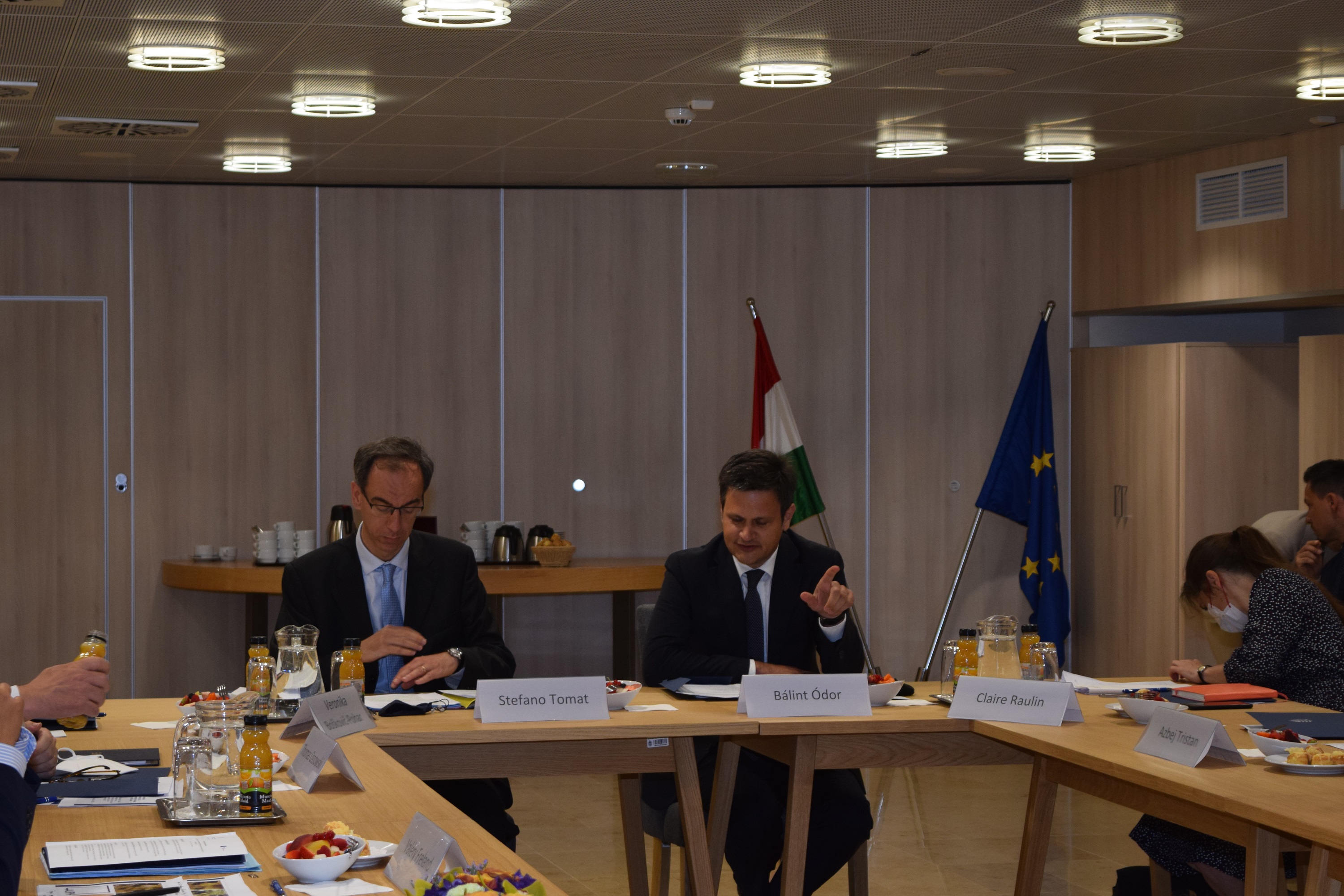
State Secretary Tristan Azbej responsible for Hungarian humanitarian assistance policy presented the Hungary Helps program with the goal to gather good practices, draw conclusions and provide ideas to encourage stronger engagment of the EU institutions in the field of the protection of cultural heritage in conflict areas. Ambassador Bálint Ódor at the closing of the event initiated the creation of a new “Friends of Cultural Heritage Network”.
V4 AND V4+SLOVENIA SUMMIT IN LJUBLJANA, 9 JULY 2021
At the first summit of heads of government under the Hungarian V4 Presidency, Prime Ministers of the V4 met in Ljubljana with the Prime Minister of Slovenia that holds the Presidency of the Council of the European Union, to discuss current issues and potential cooperation at the beginning of Hungary’s year-long V4 Presidency and Slovenia’s EU Presidency in the first half of 2021.
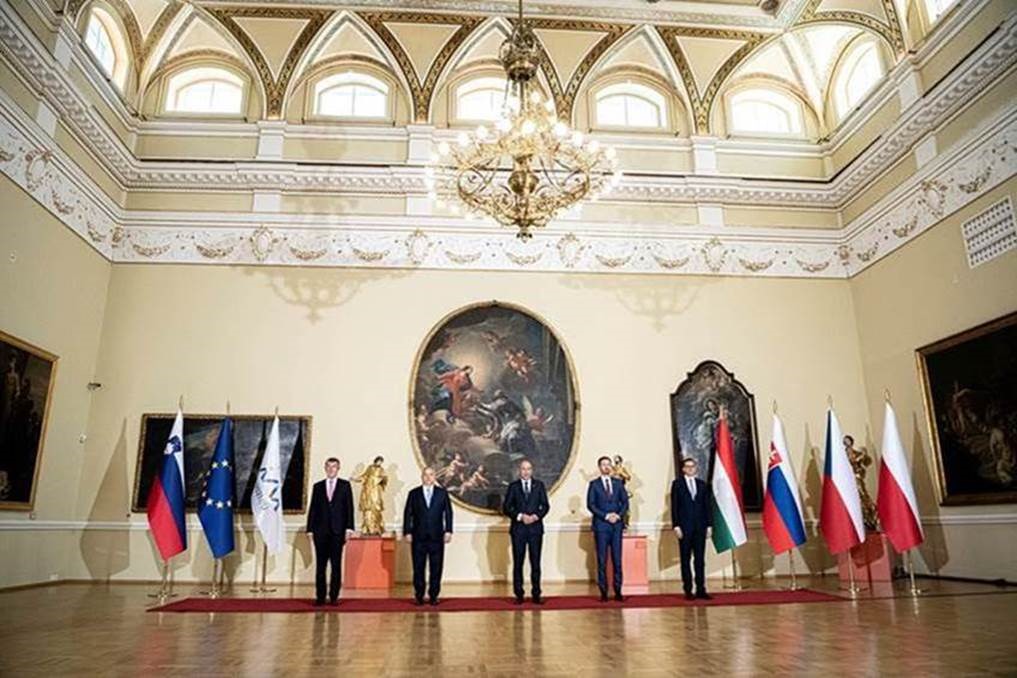
Photo: MTI
The Prime Ministers’ consultations focussed on the priorities of both Presidencies, the conference on the future of Europe, the situation in the Western Balkans and EU enlargement, security and resilience (e.g. in relation to tackling migration), and climate policy, among others.
Before the V4+Slovenia meeting, the V4 Prime Ministers adopted a joint statement in which they agreed to cooperate closely during the 2021/22 Hungarian V4 Presidency in key policy areas like the Conference on the Future of Europe, migration and asylum, climate policy, and EU enlargement. Read the full joint statement here.
At the press conference following the summit, Slovenian Prime minister Janez Janša said that "the positions of the Visegrád Group on the priorities of the Slovenian Presidency largely reflect Slovenia’s positions as well". He highlighted that these shared priorities included recovery and resilience, EU strategic autonomy, EU security and credibility, as well as the European way of life. He then thanked the four Prime Ministers for cooperating even during the pandemic and specifically thanked the Polish and Hungarian Prime Ministers for their help in protecting the external Schengen borders.
Hungarian Prime Minister Viktor Orbán underlined that restarting the economy was the most important priority, which requires investment, security and expanding markets. He emphasized that there would be investments only if taxes are not raised, but reduced. There will be security if the Central European countries continue to represent their joint position on migration, which does not support any mandatory distributional quota. Finally, there is a need to expand markets, which will be possible only if the countries of the Western Balkans are admitted to the EU as soon as possible, thus strengthening the Union. He said that the EU would be facing difficult issues over the next six months – from the climate package to migration – and it was fortunate that it is Slovenia that holds the presidency of the EU Council in this period, led by Mr Janez Janša who has a historical perspective when it comes to assessing European issues. "Hungary will do everything it can in the coming months to support the Slovenian Presidency in making it a success," he said.
Slovakia’s Prime Minister, Eduard Heger underlined that the EU-presidency's priorities were well-balanced and reflected the topics that are currently important in the EU. "We support Slovenia in the implementation of these priorities, including the rule of law", he said. He stressed the need to increase vaccination coverage in Europe, which, along with economic recovery, is in the focus in Slovakia as well. In the debate about the EU’s future, citizens must remain at the heart of the process. He highlighted digitalisation as a great opportunity and also a risk for the EU, and therefore welcomed cooperation between the V4 and Slovenia on cyber security and fighting disinformation. As for the climate package to be presented by the European Commission, Slovakia supports carbon neutrality, but the measures to be taken must prevent energy poverty. Finally, he expressed his full support to the Slovenian EU Presidency, and called for accelerating the accession negotiations with the Western Balkans countries.
Andrej Babiš, Prime Minister of the Czech Republic also stated that achieving a high level of vaccination coverage was crucial. "We must convince our citizens to take the vaccine if we want to return to normality and if we want our children to go to school in autumn," he stated. Mr. Babiš appreciated the priorities of the Hungarian V4 Presidency. He hoped that the resilience and recovery plans for the V4 countries would be approved and that EU funds could be used for rebooting the economy. The Prime Minister emphasised that the Schengen area was the most important topic of the working consultation with Slovenia, which topic is strongly linked to the issues of migration and security, since Europe is threatened by a strong wave of migration from Afghanistan due to the reduced military presence there. He added that the situation in Mali was similar and the military presence there should be strengthened.
The Prime Minister of Poland, Mateusz Morawiecki, started by positively assessing Slovenia’s EU presidency plan, and emphasised the need to rebuild the economy and ensure growth. He stressed that the EU is strategically strong only if its members are strong, and that the voice of Central Europe had to be heard very well in the debate on the future of Europe. Rejecting the centralisation of the EU, he argued for a strong role for sovereign states working together, particularly in economic terms. As for migration, defending the EU’s external borders is key. Asia and sub-Saharan Africa are the two sources of migration, and the reduction of European troops in these areas was not a step in the right direction. Considering a possible fourth wave, international cooperation in effectively fighting the COVID pandemic is crucial. He concluded by expressing that that there was no room in the EU for better or worse categories of member states, and double standards. The Prime Minister expressed hope that Slovenia would be able to focus on real problems such as migration and the pandemic during its presidency.
https://v4.mfa.gov.hu/news/joint-statement-of-the-prime-ministers-of-the-visegrad-group
Finance ministers met on 13 July in the ECOFIN Council Meeting
They first discussed the Commission’s proposal of the Sustainable Finance package adopted on 6 July, which includes a new Strategy for Financing the Transition to a Sustainable Economy, a legislative proposal for a Regulation on European Green Bonds and a delegated Regulation under Article 8 of Taxonomy detailing disclosure rules in place. Hungarian minister Mihály Varga supported the Commission's aim of directing private capital as much as possible towards sustainable activities. The new Strategy for Financing the Transition to a Sustainable Economy is an important step forward, but it is necessary to take into account challenges of the transition period and help activities that gradually lead to a climate-neutral economy. He also supported the issuance of green bonds as they can make it easier to carry out green investments and can contribute to achieving the climate and environment protection goals of the European Union. Finally, he called on the European Commission to publish the supplementing delegated act on technical screening criteria of nuclear energy and natural gas related activities without delay.
Afterwards, the Presidency updated ministers on the state of play of current financial services legislative proposals and also presented to ministers its priorities in the ECOFIN area.
In the context of the implementation of the Recovery and Resilience Facility, the Commission presented the state of play with the assessment of the Recovery and Resilience Plans and the next steps, including on the procedures to proceed with the disbursement of pre-financing after adoption of the Council Implementing Decisions. The Commission also updated ministers on the progress with the financing of Next Generation EU. In this context the Council adopted Implementing Decisions approving the Commission’s assessment of the recovery and resilience plans of 12 countries.
Under the 2021 European Semester, the Council approved the conclusions on the 2021 in-depth reviews.
Finally, the Presidency, the Commission and the Italian G20 Presidency informed the ministers about the outcomes of the G20 Finance Ministers and Central Bank Governors meeting which took place on 9 and 10 July in Venice.
Informal meeting of home affairs ministers - 15th July, 2021, Brdo pri Kranju, Slovenia
The informal Council meeting of the home affairs ministers, organized by the Slovenian Presidency of the Council of the European Union, was held in Brdo (Slovenia) on 15 July 2021, at which Hungary was represented by Deputy Prime Minister Sándor Pintér, Minister of Interior.
With the participation of the EU JHA agencies, Member States held a debate on the implications of artificial intelligence for the law enforcement sector and the opportunities of fighting crime in a digital age. In his contribution, Minister Sándor Pintér emphasized that criminals adapting to a virtual environment without geographical constraints are becoming more prepared. He also outlined that the success of the measures against those criminals can be achieved by ensuring technological superiority, cooperation, sharing data on a mutual basis and elaborating joint trainings, to which the European Police College (CEPOL) - established in Budapest - could contribute. The achievements in the field of technology and innovation must also be followed by the legislative framework, for which the 20-year-old Budapest Cybercrime Convention provides an excellent foundation.
The Presidency provided information on the Brdo Process (established in 2010 bringing together the countries of the Western Balkans) Ministerial Meeting, held on 10 June 2021, stressing the need for the countries of the region to develop effective cooperation with the European Union in the field of migration and internal security.
Over the working lunch, home affairs ministers reviewed options for taking forward negotiations on the EU Pact on Migration and Asylum. Maintaining its previous position, Hungary emphasized that migration-related issues could only be agreed by consensus, adopting the relevant legislative proposals as a package. Mandatory relocation is not a viable solution to stop illegal migration, but border protection and cooperation with third countries provides the right answers.
Member States discussed the proposals for the practical implementation of the recently presented EU Schengen Strategy. The Schengen area without borders represents one of the greatest achievements of the EU integration, but it has faced a number of challenges in recent years. At the conference, Sándor Pintér emphasized: Hungary consistently supports the proper functioning of the Schengen area. Maintaining internal border controls cannot be a solution to the challenges that arise at European level, and an area without internal borders is inconceivable without the proper control of the external borders.
Hungary urged support for the beekeeping sector at the meeting of the Agriculture and Fisheries Council on 19 July 2021
Hungary presented concrete proposals for measures to help the beekeeping sector at Monday's Agriculture and Fisheries Council. The document was fully supported by France, Greece, Croatia, Italy and Romania.
Agriculture ministers adopted Council conclusions on the EU action plan for organic production. Achieving the 25% target of organic farming by 2030 requires to take into account the different starting points and production characteristics in the Member States.
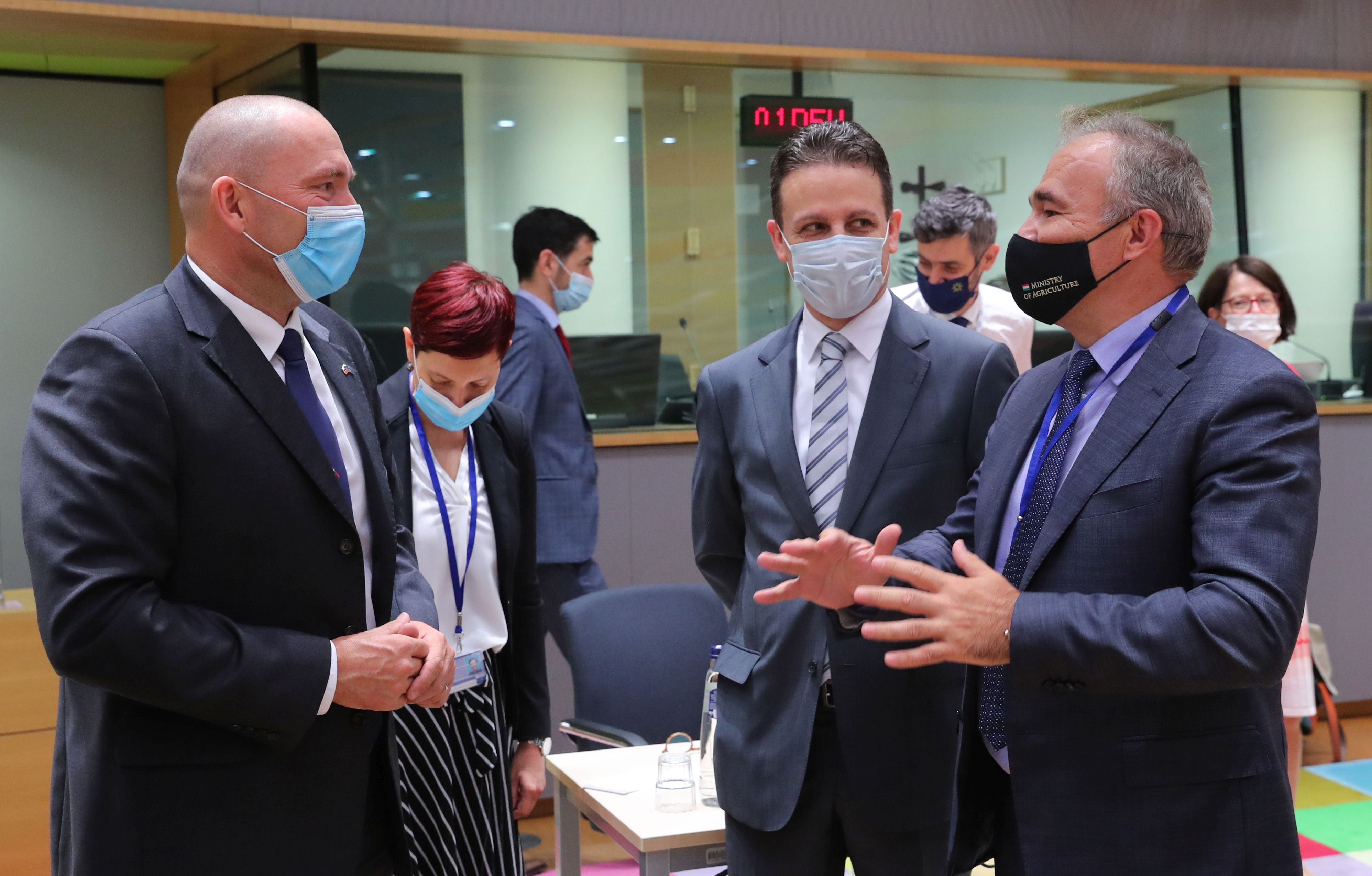
Commissioner for Agriculture Janusz Wojciechowski provided information on the development of agricultural exports and imports and reported on the current developments in the free trade negotiations.
During an informal lunch, agriculture ministers discussed the challenges facing agriculture in the context of climate change and sustainable food systems, with the US Secretary of Agriculture, Tom Vilsack.
The agenda of the Council meeting also included three issues on animal welfare: the "End the cage age!" European Citizens' Initiative, the improvement of animal welfare conditions in turkey farming and the ban on the systematic killing of male day-old chicks.
Extraordinary Justice and Home Affairs Meeting, 31 August 2021, Brussels
At the initiative of the Slovenian Presidency, an extraordinary meeting of Justice and Home Affairs Council took place on 31 August 2021. At the meeting, the ministers of interior held a comprehensive discussion on the implications of the situation in Afghanistan in the field of home affairs, and adopted a joint Statement which represents a unified EU approach in this regard. Hungary was represented by Dr. Sándor Pintér, Deputy Prime Minister and Minister of the Interior.
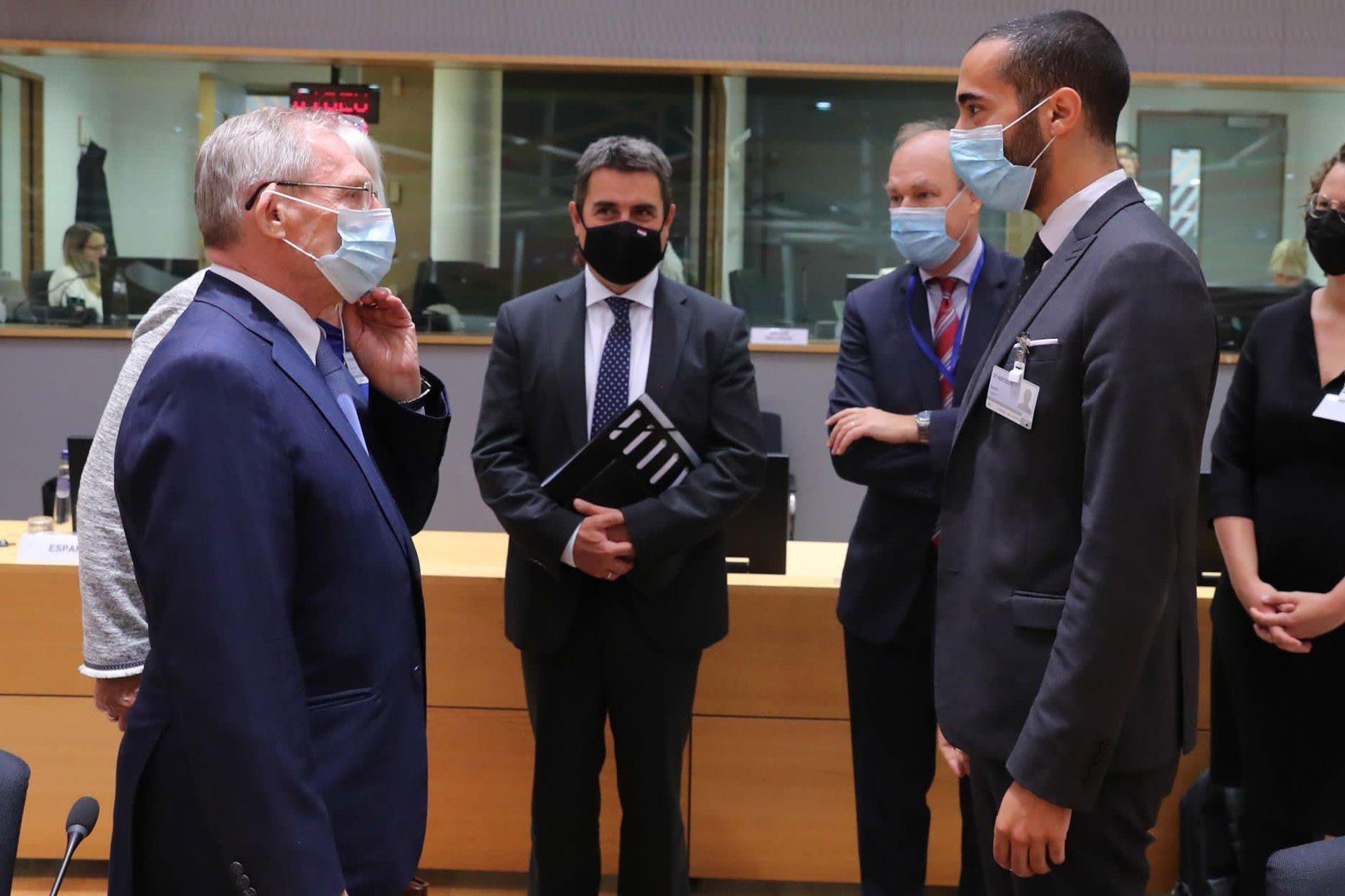
The adopted joint Statement reflects in many respects the long-standing Hungarian position according to which migratory crisis should be tackled locally in the region of their origin. Member States have expressed their commitment to enhance their support to countries neighbouring and transit countries hosting large numbers of asylum seekers, in order to strengthen their reception, as well as border management capacities and to ensure the sustainable livelihoods of those in need of international protection in the host communities. Another key element of the adopted joint Statement is that the EU and its Member States will do their utmost to ensure that the situation in Afghanistan does not lead to new security threats for EU citizens. To this end the EU and its Member states remain determined to effectively protect the EU external borders and prevent unauthorized entries, including by carrying out appropriate security checks.
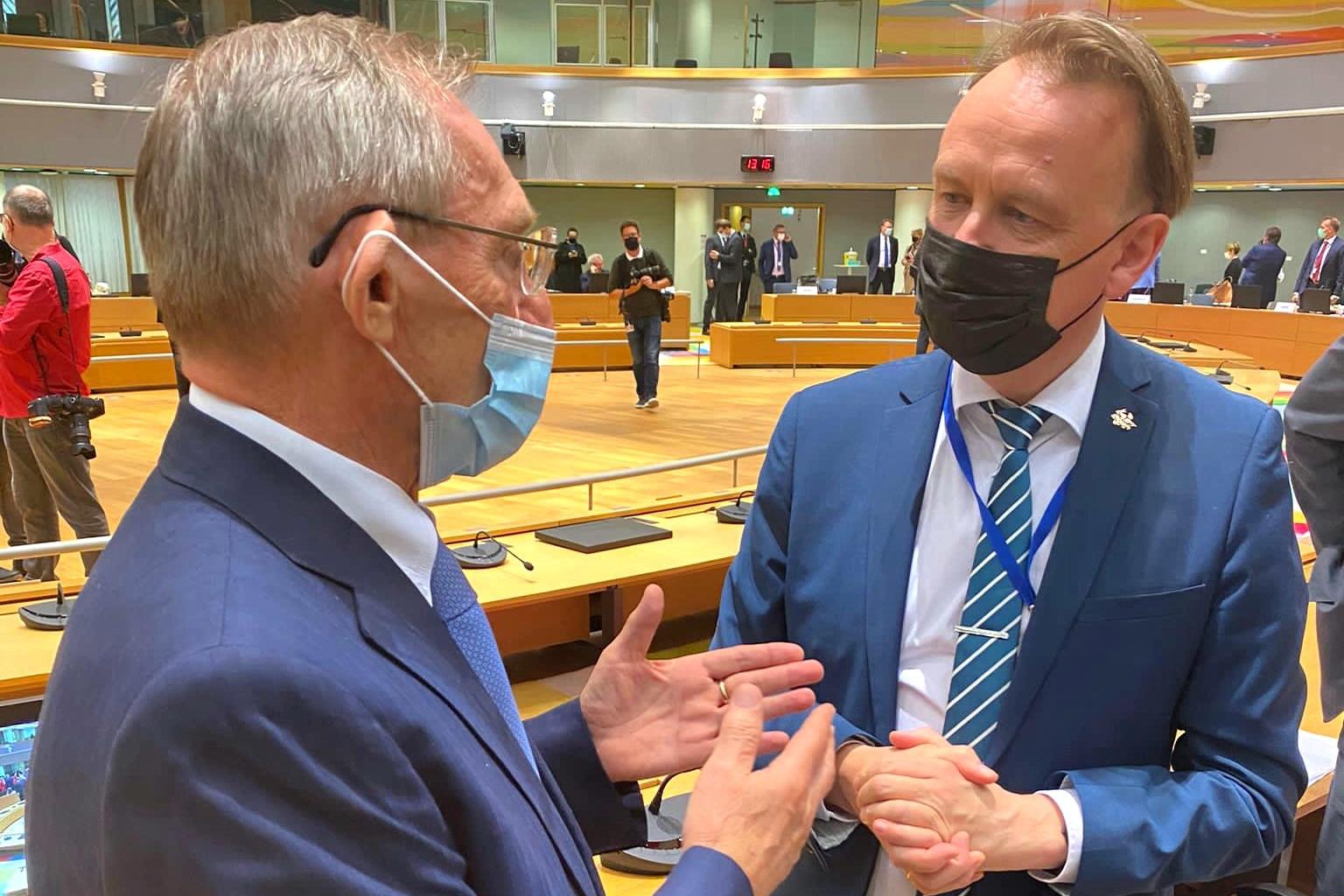
European rural areas should be the winners of the new programming period
Main challenges of the rural areas were the main topic of the Informal Meeting of Agricultural Ministers held in Slovenia
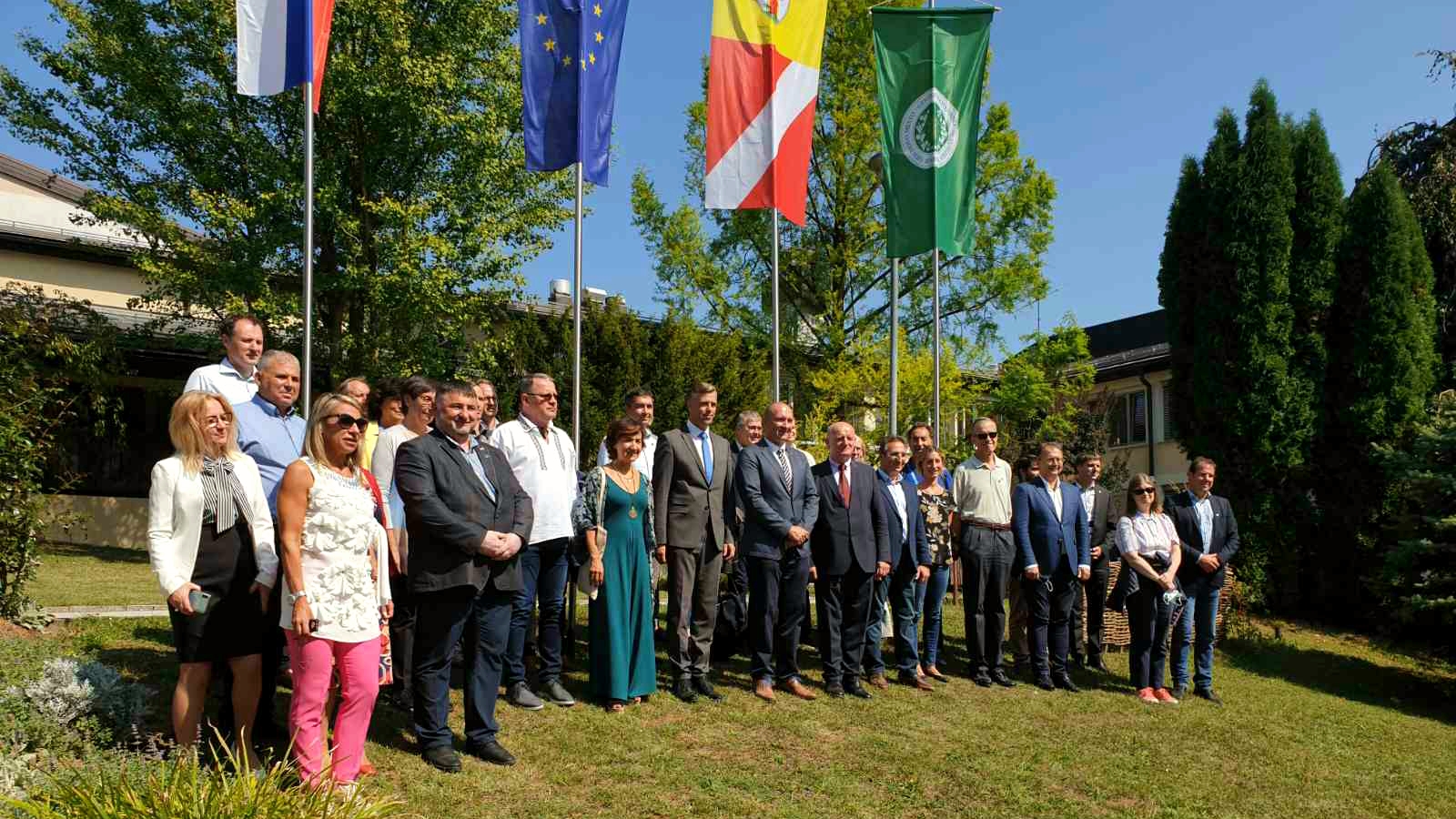
The main agenda point of the Informal Meeting of Agricultural Ministers held in Brdo pri Kranju (5-7 September) was to discuss the challenges rural areas are facing and the importance of strengthening the dialogue between rural and urban areas
EU Agriculture Ministers agreed that rural areas will play a crucial role in the future of Europe.
State Secretary Zsolt Feldman, recalled that the upcoming programming period will be a great opportunity for strengthening family farming, modernizing agricultural enterprises, creating job opportunities and providing better public services This combined effort would make the rural areas more liveable, attractive and economically stronger. From the environmental aspect he highlighted, that without farmers it is not possible to preserve the traditional European landscape, which was formed by agricultural activities in the past centuries. The traditions of rural areas are important for the whole society as they are part of the national identity.
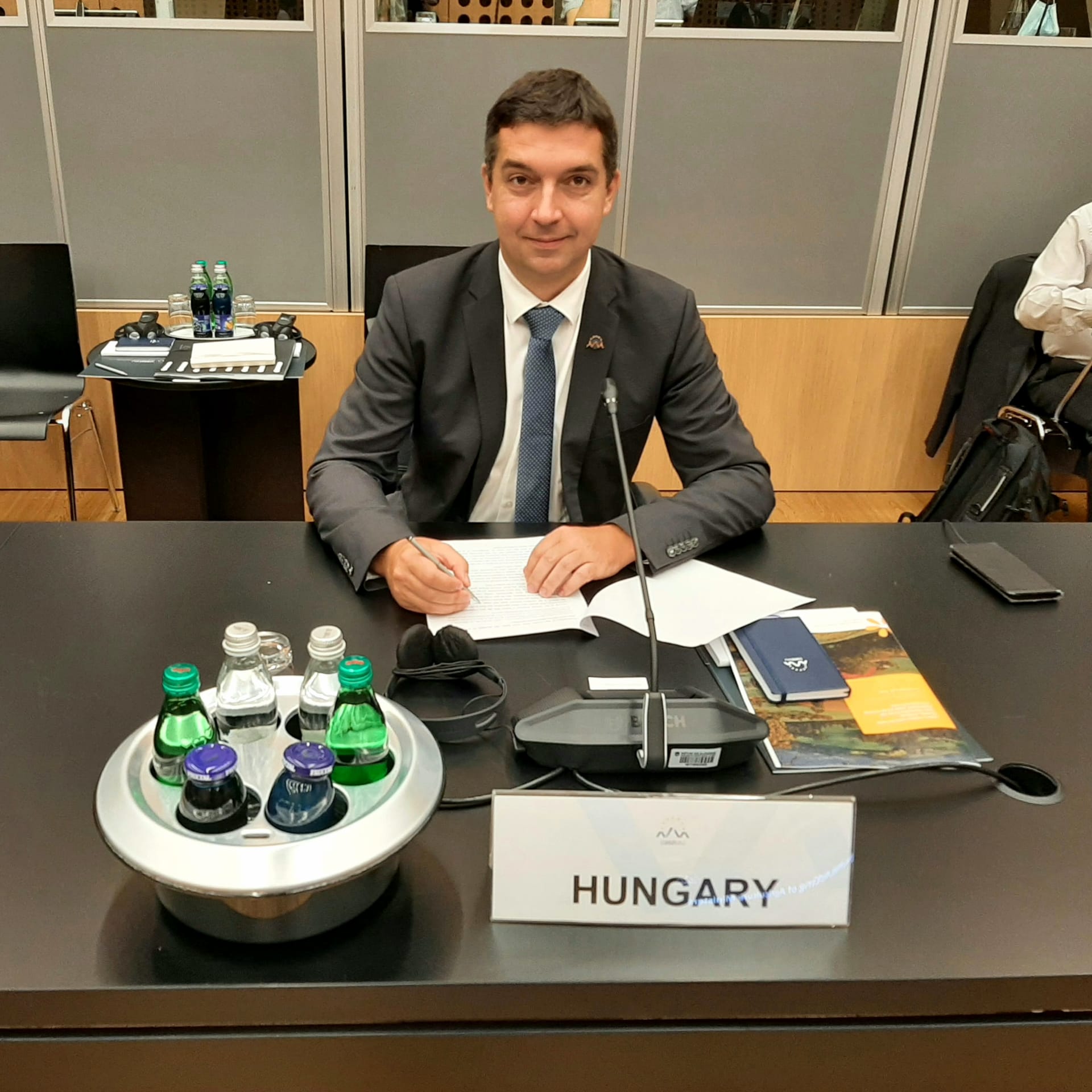
In conclusion he encouraged all stakeholders to work together in order to make all European rural areas the winners of the new programming period.
General Affairs Council, 21 September 2021, Brussels
Within the framework of the Hungarian V4 Presidency, a V4 coordination meeting took place before the General Affairs Council meeting on the 21st of September. At the V4 coordination meeting and the General Affairs Council meeting, Hungary was represented by Secretary of State Oszkár Ökrös. At the General Affairs Council meeting, the Council was chaired by Gašper Dovžan, Slovenian Secretary of State for EU Affairs, and the Commission was represented by Vice-Presidents Maroš Šefčovič and Dubravka Šuica.
Presentation of the priorities of the Slovenian Presidency
At the General Affairs Council meeting on 21 September 2021, the Presidency formally presented the main priorities of their Presidency under a public agenda item. The Presidency presented in particular the key priorities and the work schedule until the end of the year. Among the priorities, the Presidency emphasized the need to ensure effective response and coordination against the epidemic and to strengthen our resilience to further epidemics. The Presidency also emphasized that the EU and the Presidency are also focusing on the economic recovery based on the green and digital transition, drawing attention to the importance of swift and effective implementation of the EU's recovery instrument. Another priority is the fight against climate change, which is why the Presidency is currently focusing on the negotiations on the "Fit for 55" climate and energy package. The Presidency will also place great emphasis on the digital transition and on improving the EU's preparedness and strategic autonomy for future crises.
Preparation of the European Council on 21-22 October 2021
The General Affairs Council held an exchange of views about the preparation of the upcoming special European Council meeting on the 21st and 22nd of October based on the Annotated Draft Agenda. The Ministers focused the discussion on the Covid-19 pandemic, the digitalization, and the external relations.
COVID-19 EU coordination
The General Affairs Council took stock of the actual situation regarding the Covid-19 pandemic. A good vaccination coverage has been achieved in most of the member states and the digital Covid certificate was successfully introduced at the beginning of the summer tourist season. The ministers shared the view that the EU needs to continue to contribute to better global access to vaccines and it would be useful to achieve the mutual recognition of vaccine certificates with more third countries. The biggest challenge however is to fight vaccine hesitancy. All the ministers agreed that that vaccination means the only effective tool to beat pandemic and save citizens’ lives.
Conference on the Future of Europe
The Presidency informed the ministers about the state of play regarding the Conference on the Future of Europe, following the launch of the European citizens' panels on 17 September and in the run-up to the October plenary.
The first of four European Citizens' Panels started its work with a session in Strasbourg from Friday, 17 September to Sunday, 19 September 2021.
The Panels lie at the heart of the Conference on the Future of Europe and will bring together 800 citizens from all backgrounds and corners of the EU. From September 2021 to January 2022, four panels, each comprising 200 citizens, reflecting the EU's demographic and social diversity will deliberate and make concrete recommendations on the future direction they want for Europe. Each panel will meet once to kick off their work before the next Conference Plenary meeting on 22-23 October.
The Presidency reiterated that the Executive Board of the Conference has invited all EU citizens to contribute to shaping their own future and that of Europe as a whole on the digital platform (https://futureu.europa.eu/?locale=en).
Legislative programming
Under legislative programming Vice-President Maroš Šefčovič presented the Commission’s second annual strategic foresight report, adopted on 8 September, and its letter of intent, published on 15 September. The latter outlines the key initiatives for 2022, and will form the basis of the Commission’s 2022 work programme. Member States broadly welcomed the priorities set out in the Commission documents, in particular the initiatives aiming at ensuring the EU's strategic autonomy, enhancing the EU's resilience, strengthening the EU's global role, diversifying supply chains of critical raw materials, strengthening cyber resilience and removing barriers to the single market as well as those related to the digital transition and competition policy. Following the presentation of the Commission's annual work programme, the Council will return to the subject in November with a view to preparing the Joint Declaration of the three institutions on legislative priorities for 2022.
EU-UK relations
On the basis of Commission Vice President Maroš Šefčovič’s update, the General Affairs Council discussed the state of play of EU-UK relations. The discussion primarily focused on the problems related to the implementation of the Northern Ireland Protocol of the Withdrawal Agreement. Member States supported the Commission’s efforts to find and discuss with the UK, long-term, flexible and practical solutions to implementation problems identified by Northern Ireland businesses and citizens. Member States also agreed that the Protocol cannot be renegotiated.
EU-Switzerland relations
The Council was briefed by the Commission on EU-Switzerland relations, in particular on the termination of negotiations on the Institutional Framework Agreement, the Ministers then took stock of the EU-Switzerland relations.
EU-Mediterranean Summit
Greece provided information on the EU-Mediterranean Summit (EUMED 9) held in Athens on 17 September 2021, which focused on the challenges posed by climate change and reflected international developments. At the same time, Greece thanked the Member States for their support and solidarity during the August forest fires.
